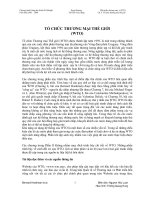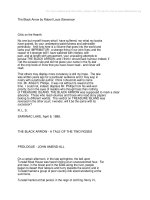Annajanska, the Bolshevik Empress
Bạn đang xem bản rút gọn của tài liệu. Xem và tải ngay bản đầy đủ của tài liệu tại đây (71.6 KB, 11 trang )
Annajanska, the Bolshevik Empress
by
George Bernard Shaw
Web-Books.Com
Annajanska, the Bolshevik Empress
ANNAJANSKA is frankly a bravura piece. The modern variety theatre demands
for its "turns" little plays called sketches, to last twenty minutes or so, and to
enable some favorite performer to make a brief but dazzling appearance on
some barely passable dramatic pretext. Miss Lillah McCarthy and I, as author
and actress, have helped to make one another famous on many serious
occasions, from Man and Superman to Androcles; and Mr Charles Ricketts has
not disdained to snatch moments from his painting and sculpture to design some
wonderful dresses for us. We three unbent as Mrs Siddons, Sir Joshua Reynolds
and Dr Johnson might have unbent, to devise a turn for the Coliseum variety
theatre. Not that we would set down the art of the variety theatre as something to
be condescended to, or our own art as elephantine. We should rather crave
indulgence as three novices fresh from the awful legitimacy of the highbrow
theatre.
Well, Miss McCarthy and Mr Ricketts justified themselves easily in the glamor of
the footlights, to the strains of Tchaikovsky's 1812. I fear I did not. I have
received only one compliment on my share; and that was from a friend who said,
"It is the only one of your works that is not too long." So I have made it a page or
two longer, according to my own precept: EMBRACE YOUR REPROACHES:
THEY ARE OFTEN GLORIES IN DISGUISE.
Annajanska was first performed at the Coliseum Theatre in London on the 21st
January, 1918, with Lillah McCarthy as the Grand Duchess, Henry Miller as
Schneidekind, and Randle Ayrton as General Strammfest.
ANNAJANSKA, THE BOLSHEVIK EMPRESS
The General's office in a military station on the east front in Beotia. An office
table with a telephone, writing materials, official papers, etc., is set across the
room. At the end of the table, a comfortable chair for the General. Behind the
chair, a window. Facing it at the other end of the table, a plain wooden bench. At
the side of the table, with its back to the door, a common chair, with a typewriter
before it. Beside the door, which is opposite the end of the bench, a rack for caps
and coats. There is nobody in the room.
General Strammfest enters, followed by Lieutenant Schneidekind. They hang up
their cloaks and caps. Schneidekind takes a little longer than Strammfest, who
comes to the table.
STRAMMFEST. Schneidekind.
SCHNEIDEKIND. Yes, sir.
STRAMMFEST. Have you sent my report yet to the government? [He sits down.]
SCHNEIDEKIND [coming to the table]. Not yet, sir. Which government do you
wish it sent to? [He sits down.]
STRAMMFEST. That depends. What's the latest? Which of them do you think is
most likely to be in power tomorrow morning?
SCHNEIDEKIND. Well, the provisional government was going strong yesterday.
But today they say that the Prime Minister has shot himself, and that the extreme
left fellow has shot all the others.
STRAMMFEST. Yes: that's all very well; but these fellows always shoot
themselves with blank cartridge.
SCHNEIDEKIND. Still, even the blank cartridge means backing down. I should
send the report to the Maximilianists.
STRAMMFEST. They're no stronger than the Oppidoshavians; and in my own
opinion the Moderate Red Revolutionaries are as likely to come out on top as
either of them.
SCHNEIDEKIND. I can easily put a few carbon sheets in the typewriter and send
a copy each to the lot.
STRAMMFEST. Waste of paper. You might as well send reports to an infant
school. [He throws his head on the table with a groan.]
SCHNEIDEKIND. Tired out, Sir?
STRAMMFEST. O Schneidekind, Schneidekind, how can you bear to live?
SCHNEIDEKIND. At my age, sir, I ask myself how can I bear to die?
STRAMMFEST. You are young, young and heartless. You are excited by the
revolution: you are attached to abstract things like liberty. But my family has
served the Panjandrums of Beotia faithfully for seven centuries. The
Panjandrums have kept our place for us at their courts, honored us, promoted us,
shed their glory on us, made us what we are. When I hear you young men
declaring that you are fighting for civilization, for democracy, for the overthrow of
militarism, I ask myself how can a man shed his blood for empty words used by
vulgar tradesmen and common laborers: mere wind and stink. [He rises, exalted
by his theme.] A king is a splendid reality, a man raised above us like a god. You
can see him; you can kiss his hand; you can be cheered by his smile and terrified
by his frown. I would have died for my Panjandrum as my father died for his
father. Your toiling millions were only too honored to receive the toes of our boots
in the proper spot for them when they displeased their betters. And now what is
left in life for me? [He relapses into his chair discouraged.] My Panjandrum is
deposed and transported to herd with convicts. The army, his pride and glory, is
paraded to hear seditious speeches from penniless rebels, with the colonel
actually forced to take the chair and introduce the speaker. I myself am made
Commander-in-Chief by my own solicitor: a Jew, Schneidekind! a Hebrew Jew! It
seems only yesterday that these things would have been the ravings of a
madman: today they are the commonplaces of the gutter press. I live now for
three objects only: to defeat the enemy, to restore the Panjandrum, and to hang
my solicitor.
SCHNEIDEKIND. Be careful, sir: these are dangerous views to utter nowadays.
What if I were to betray you?
STRAMMFEST. What!
SCHNEIDEKIND. I won't, of course: my own father goes on just like that; but
suppose I did?
STRAMMFEST [chuckling]. I should accuse you of treason to the Revolution, my
lad; and they would immediately shoot you, unless you cried and asked to see
your mother before you died, when they would probably change their minds and
make you a brigadier. Enough. [He rises and expands his chest.] I feel the better
for letting myself go. To business. [He takes up a telegram: opens it: and is
thunderstruck by its contents.] Great heaven! [He collapses into his chair. This is
the worst blow of all.
SCHNEIDEKIND. What has happened? Are we beaten?
STRAMMFEST. Man, do you think that a mere defeat could strike me down as
this news does: I, who have been defeated thirteen times since the war began?
O, my master, my master, my Panjandrum! [he is convulsed with sobs.]
SCHNEIDEKIND. They have killed him?
STRAMMFEST. A dagger has been struck through his heart--
SCHNEIDEKIND. Good God!
STRAMMFEST. --and through mine, through mine.
SCHNEIDEKIND [relieved]. Oh, a metaphorical dagger! I thought you meant a
real one. What has happened?
STRAMMFEST. His daughter the Grand Duchess Annajanska, she whom the
Panjandrina loved beyond all her other children, has--has-- [he cannot finish.]
SCHNEIDEKIND. Committed suicide?
STRAMMFEST. No. Better if she had. Oh, far far better.
SCHNEIDEKIND [in hushed tones]. Left the Church?
STRAMMFEST [shocked]. Certainly not. Do not blaspheme, young man.
SCHNEIDEKIND. Asked for the vote?
STRAMMFEST. I would have given it to her with both hands to save her from
this.
SCHNEIDEKIND. Save her from what? Dash it, sir, out with it.
STRAMMFEST. She has joined the Revolution.
SCHNEIDEKIND. But so have you, sir. We've all joined the Revolution. She
doesn't mean it any more than we do.
STRAMMFEST. Heaven grant you may be right! But that is not the worst. She
had eloped with a young officer. Eloped, Schneidekind, eloped!
SCHNEIDEKIND [not particularly impressed]. Yes, Sir.
STRAMMFEST. Annajanska, the beautiful, the innocent, my master's daughter!
[He buries his face in his hands.]
The telephone rings.
SCHNEIDEKIND [taking the receiver]. Yes: G.H.Q. Yes...Don't bawl: I'm not a
general. Who is it speaking?...Why didn't you say so? don't you know your duty?
Next time you will lose your stripe...Oh, they've made you a colonel, have they?
Well, they've made me a field-marshal: now what have you to say?...Look here:
what did you ring up for? I can't spend the day here listening to your
cheek...What! the Grand Duchess [Strammfest starts.] Where did you catch her?









